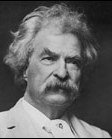 "There are some things that can beat smartness and foresight. Awkwardness and stupidity can. The best swordsman in the world doesn't need to fear the second best swordsman in the world; no, the person for him to be afraid of is some ignorant antagonist who has never had a sword in his hand before; he doesn't do the thing he ought to do, and so the expert isn't prepared for him; he does the thing he ought not to do; and often it catches the expert out and ends him on the spot" Mark Twain
"There are some things that can beat smartness and foresight. Awkwardness and stupidity can. The best swordsman in the world doesn't need to fear the second best swordsman in the world; no, the person for him to be afraid of is some ignorant antagonist who has never had a sword in his hand before; he doesn't do the thing he ought to do, and so the expert isn't prepared for him; he does the thing he ought not to do; and often it catches the expert out and ends him on the spot" Mark Twain
People who "don't know what they don't know" or "fail to grasp that something can't be done" are sometimes brilliant, often dangerous and should never, in any case, be underestimated. The Twain quotation sums up this important lesson. Amazon.com, FedEx, Xerox, Google, and Oreo cookies are but a few examples of ventures launched by folks who "didn't know they were suppose to fail." Counter intuitive thinking is a powerful tool. My friend Bob Henabery calls this "the ability to drive on the left-hand side of the road." The "first-time exec" typically comes to the work of a new office with fresh, clear senses. This acuity is generally short-lived. The executive begins with a view of the landscape, the forest and over time begins to see trees, then a single tree, and finally perception narrows to a field of view that is sub-atomic bark. Keeping a journal to record unvarnished first impressions and instincts provides the trail of bread crumbs that may serve to help restore perspective, getting one out of the weeds if not clear of the darker canopy. "Fresh" eyes, ears, first impressions and instincts should be welcomed, your team will benefit from the clearly stupid questions of uninformed outsiders. Beware the "that's the way we've always done it" or the equally dangerous "because that's the way we do things around here" mindset, it's toxic and an end of days symptom. The "what" and "why" questions are critical, once answered the best "how" questions and options can be discovered and developed. Dare to be naive.
Dr Gary Hamel writes...
"Dakota tribal wisdom says that when you discover you're on a dead horse, the best strategy is to dismount. Of course, there are other strategies. You can change riders. You can get a committee to study the dead horse. You can benchmark how other companies ride dead horses. You can declare that it's cheaper to feed a dead horse. You can harness several dead horses together. But after you've tried all these things, you're still going to have to dismount. The temptation to stay on a dead horse can be overwhelming...The time to start searching for new wealth-creating strategies is long before the horse stumbles...Denial is tragic. Delay is deadly. There is solid evidence that world-beating strategies seldom last even a decade...Success has never been more transient. Don't let anyone tell you otherwise...The companies that are creating new wealth are not just getting better; they're getting different - profoundly different."
How, exactly, is your venture profoundly different?
Allow me to suggest...In the first days of any new venture ask a deep variety of folks this question...what three things must I know about_________ (insert...this space, this market, this environment, this challenge, etc.). Keep a record of responses for study and reflection.
When I first arrived in Dallas a wise longtime local answered my question "What three things must I know about Dallas" with "you will be judged by 1) where you live 2) what you drive 3)the quality of your wife's jewelry"
Finally, one reason I admire and respect the work of Gary Hamel, Seth Godin, Edward deBono, Peter Drucker and Michael Michalko is they have each dared to approach common problems using uncommon perspectives. You'll benefit from a reading of each and all.
Thursday, April 13, 2006
Subscribe to:
Post Comments (Atom)


0 comments:
Post a Comment